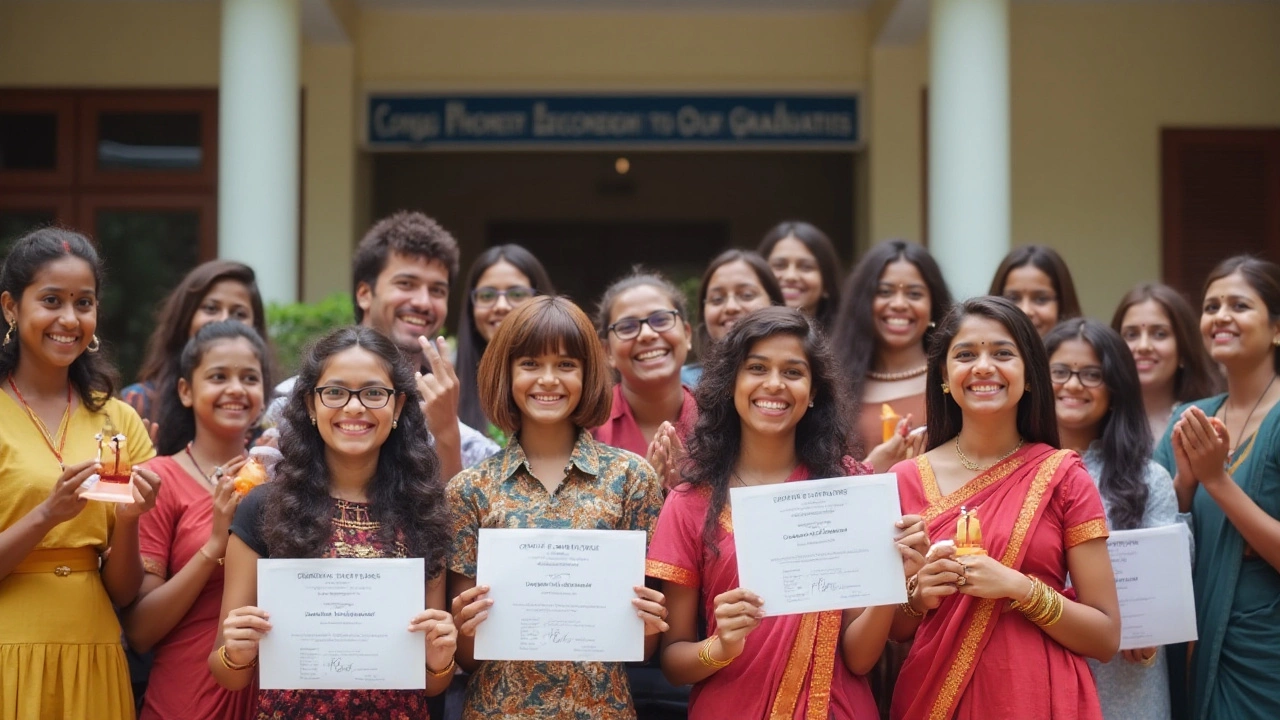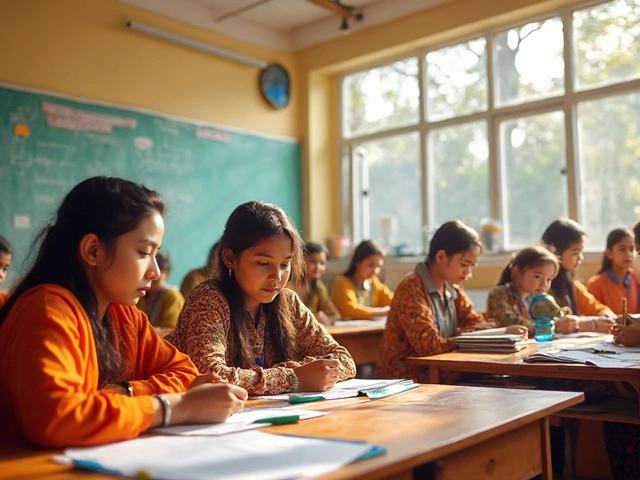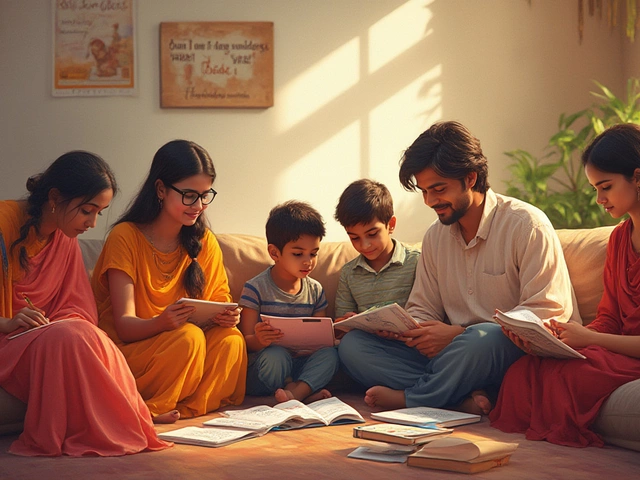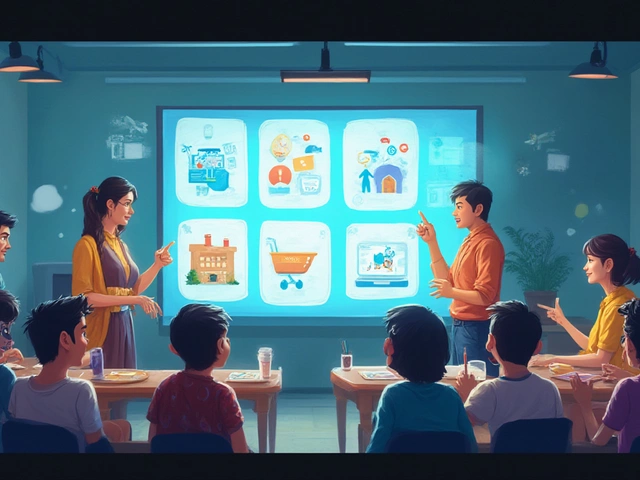In India, achieving the 12th class certificate is a hallmark that signifies the end of higher secondary education. Frequently termed the Higher Secondary Certificate (HSC) or Senior Secondary School Certificate (SSSC), this qualification is pivotal for students aspiring to step into the realm of higher education or professional courses. The 12th grade represents a crucial period filled with diverse learning experiences tailored to prepare students for future challenges.
A significant number of students participate in the CBSE curriculum, known for its comprehensive and holistic approach. This curriculum ensures students are well-equipped with knowledge across various subjects, fostering opportunities for specialization and further studies. It is essential for students and guardians to comprehend the value of this academic journey and the potential paths it opens.
Whether pursuing college degrees, vocational courses, or direct employment, the 12th grade certificate plays an integral role in defining the next steps for many young Indians. It acts as a bridge connecting their school education with their future aspirations.
- Defining the 12th Class Graduation in India
- Role of CBSE in Indian Education
- Significance of the 12th Certificate
- Options After Completing 12th Grade
- Challenges Faced by Students
- Tips for Excelling in the 12th Grade
Defining the 12th Class Graduation in India
In India, the culmination of high school education is marked by the completion of the 12th grade, a significant stage often regarded as the gateway to higher education. This phase is symbolized by the attainment of a 12th grade certificate, commonly referred to as the Higher Secondary Certificate (HSC) or the Senior Secondary School Certificate (SSSC). Acting as a bridge between school education and advanced studies or professional pursuits, this graduation holds immense weight in a student's academic journey. At this level, students choose subjects that align with their future career aspirations, such as science, commerce, or humanities.
The education system, particularly with the CBSE syllabus, aims to provide a balanced foundation of theoretical knowledge and practical skills. This structured approach ensures that students are not just prepared for exams but also equipped to tackle real-world challenges. Many esteemed institutions in India and overseas recognize the value bestowed upon the 12th-grade certificate, seeing it as a testament to the student's dedication and preparedness for collegiate education. It's a testament to a young adult's capability to handle the rigors of advanced learning.
According to the National Sample Survey Organization, more than 30 million students annually embark on this ambitious educational milestone, highlighting its critical role in shaping India’s educated workforce.
During the 12th grade, students undergo a rigorous assessment, with their performance being a decisive factor for college admissions. Examinations are comprehensive, covering the breadth of chosen subjects, and are conducted on a nationwide scale, primarily under the auspices of boards like the CBSE. The results, usually announced between May and June, can influence future educational paths, from engineering and medicine to business and the arts. This stage not only opens doors to various higher education options but also presents opportunities in vocational and skill-based careers for those inclined to enter the workforce sooner.
To navigate this pivotal year effectively, students frequently leverage supplementary educational resources ranging from tutoring centers to online platforms, seeking every advantage to excel in their examinations. Parents and educators alike emphasize the importance of a strong support system, recognizing that academic success isn't just about knowledge absorption but also managing the pressure associated with this transformative period. Schools often implement counseling sessions to aid students in identifying their strengths and interests, assisting them to make informed decisions.
Understanding and acknowledging the weight of the 12th class graduation in India can truly shape a student's future. Its importance is not only educational but also developmental, fostering both intellectual growth and personal responsibility, setting the stage for lifelong learning and professional success.
Role of CBSE in Indian Education
The Central Board of Secondary Education (CBSE) holds a pivotal position in the Indian education landscape. Established in 1962, the CBSE is one of the oldest and most recognized education boards in India, catering to a wide array of students across the country. With its headquarters in New Delhi, CBSE governs both public and private schools, offering a curriculum that is globally acknowledged and tailor-made to equip students with comprehensive informational prowess. The syllabi are meticulously designed to foster analytical skills, critical thinking, and a thorough understanding of each subject. This means that students following the CBSE curriculum receive a balanced meal of academics mixed with plenty of opportunities for co-curricular development.
One of the most noteworthy advantages of CBSE is its flexible yet structured framework, which aligns well with the demands of various competitive exams like IIT-JEE and NEET, offering students a pathway to specialized higher education. The board focuses not only on rote learning but encourages students to grasp concepts, apply knowledge, and explore extensive areas of interest. There’s a strong emphasis on sciences and mathematics, but arts and humanities are not left behind either; they are structured to enrich student understanding and appreciation.
CBSE's teaching methodology incorporates innovative learning tools such as smart classrooms, digital assessments, and project-based evaluations. This modern approach to education ensures interactive learning, fostering an environment where students participate actively rather than passively absorbing information. CBSE also emphasizes life skills, entrepreneurship, and global awareness among students to make them socially responsible citizens. These elements play a crucial role in paving the way for holistic development.
Additionally, CBSE regularly updates its syllabus to keep pace with emerging trends and technologies, empowering students with up-to-date knowledge. Such revisions are made in consultation with educators and are often based on globally benchmarked education standards. Ensuring a seamless transition from school to real-world scenarios is one of the board's strategic objectives. This dynamic nature of the CBSE's curriculum enables students to remain competitive on an international level.
In terms of geographic reach, CBSE has an extensive network of schools not just in India but also in foreign lands. More than 24,000 schools within India and over 240 schools in 26 countries across the globe are affiliated with CBSE. This vast extent speaks volumes about the credibility and acceptance of the CBSE's educational model worldwide. The board's commitment to nurturing a global perspective in its students remains unparalleled.
"Education is not just about going to school and getting a degree. It's about widening your knowledge and absorbing the truth about life." — Shakuntala Devi, writer and mathematician
Understanding the importance of the 12th-grade certificate through CBSE, it is evident how well-aligned the education system is with nurturing a robust foundation for lifelong learning. Parents and educators continuously work together under the CBSE's guidance to cultivate an enriched academic culture that supports students in reaching their highest potential, both academically and personally. The role of CBSE doesn't end at education; it prepares students to think, act, and grow into global citizens, ready to conquer their aspirations and contribute positively to society.
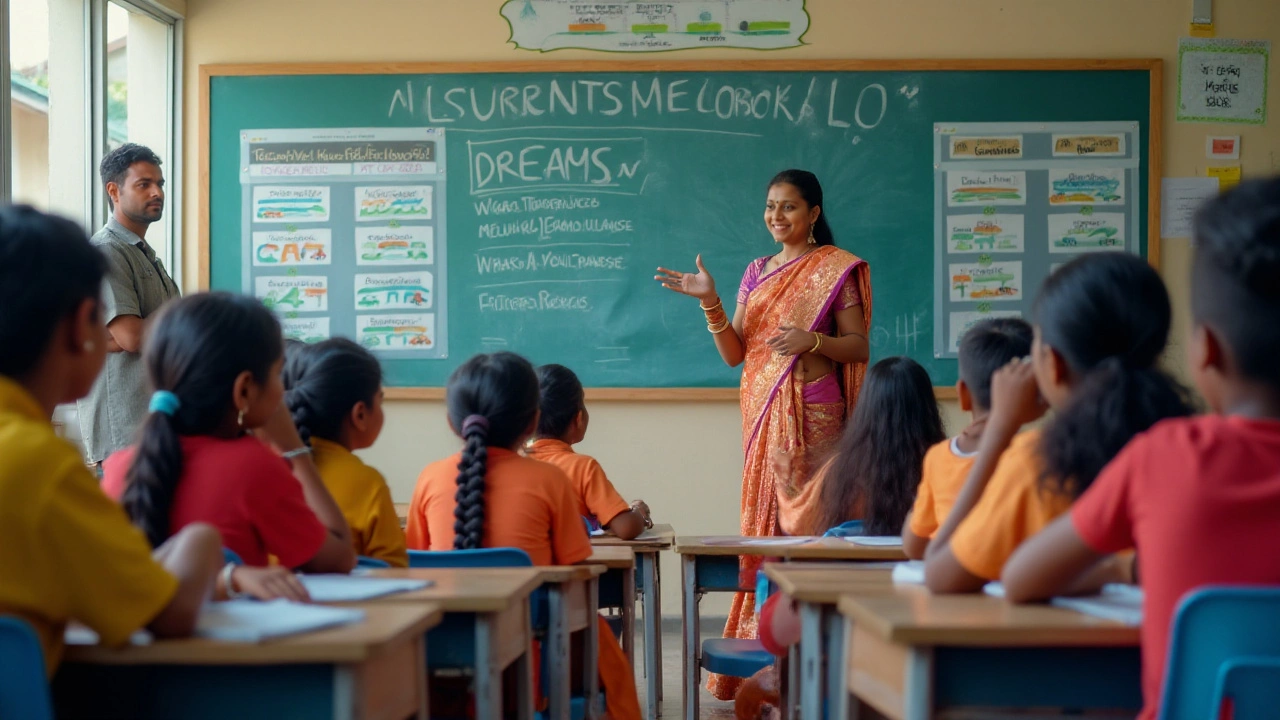
Significance of the 12th Certificate
The 12th grade certificate, often recognized as the Higher Secondary Certificate in India, holds significant importance in the academic and professional journey of students. This certificate is more than just a piece of paper; it symbolizes years of hard work, diligence, and the culmination of a student's school education. Not only does it provide a sense of accomplishment, but it also acts as a necessary credential for advancing to higher studies or entering the professional world. Many universities and colleges, both in India and around the globe, require the completion of the 12th grade as a prerequisite for admissions. Thus, possessing this certificate can widen the spectrum of educational opportunities for young adults, allowing them to explore various courses that align with their career aspirations.
The relevance of the HSC extends beyond higher education. In the realm of employment, especially for entry-level positions, the 12th grade certificate is often a minimum qualification. Many government jobs and competitive exams in India stipulate this certificate as a basic requirement. Consequently, students with this certificate may find themselves with better job prospects compared to those without it. The 12th certificate serves as an initial screening tool that employers use to gauge the educational readiness of potential candidates. In a rapidly evolving job market, where skills and educational qualifications often dictate career trajectories, the significance of the 12th grade becomes even more pronounced.
Moreover, the completion of the 12th grade marks the transition from adolescent schooling to adulthood, paving the way for a more specialized and focused educational journey. This period allows students to reflect on their educational experiences, identify their interests, and make informed decisions about their future. As a gateway to higher learning, the 12th certificate encourages students to delve deeper into specialized fields of study, nurturing their intellectual capabilities and preparing them for diverse career paths. To quote a renowned educator, "The 12th grade is not just another board examination; it is the foundation upon which students build their futures."
"Education is the passport to the future, for tomorrow belongs to those who prepare for it today." - Malcolm X
In addition to its role in academia and employment, the 12th certificate also instills a sense of confidence and independence in students. Having successfully navigated through a complex syllabus and rigorous examinations, students often emerge more self-assured, ready to face the challenges of higher education and beyond. This sense of achievement can be incredibly empowering, fostering a belief in one's abilities and potential. It is this blend of academic knowledge and personal growth that equips students to tackle the uncertainties and opportunities that lie ahead. With the right guidance and support, the 12th grade experience can be transformative, shaping not just the educational, but the holistic development of the individual.
The Role of CBSE
When discussing the 12th certificate in India, it is impossible to overlook the role of the CBSE syllabus. Central Board of Secondary Education, one of the most prevalent educational boards, sets a high standard through its structured curriculum, aiming to balance theoretical knowledge and practical skills. The CBSE syllabus is designed to hone critical thinking and problem-solving skills, preparing students for challenges in higher education and beyond. As a result, those who complete their 12th grade through CBSE often find themselves better prepared for competitive exams and global academic endeavors. The emphasis on a balanced education enshrined in the CBSE curriculum further accentuates the value of the 12th certificate.
Options After Completing 12th Grade
After finishing the 12th grade, Indian students find themselves at a significant crossroads that offers a distinct blend of opportunities, risks, and decisions. Transitioning from school to college or the workforce requires careful consideration and planning. For many, the next step is enrolling in a university program that aligns with their academic interests and career aspirations. Indian universities offer a range of undergraduate courses in fields such as engineering, medicine, arts, sciences, and commerce. Decisions made at this stage often chart the course for future careers.
A popular choice among 12th grade graduates is pursuing a field in engineering or medicine, especially those from the science stream. Entrance exams such as JEE (Joint Entrance Examination) for engineering and NEET (National Eligibility cum Entrance Test) for medical courses are highly competitive but essential stepping stones. These exams test students' grasp of key concepts learned during their higher secondary education. Acing these exams opens doors to premier institutions like the IITs and AIIMS, which are prestigious in the academic landscape.
For students drawn to the arts or commerce streams, options are equally diverse. Many choose to pursue Bachelor of Arts (BA) or Bachelor of Commerce (B.Com) degrees, with subjects ranging from economics and history to literature and finance, catering to a broad spectrum of interests. Additionally, commerce students often aim for chartered accountancy or business administration courses. Institutions like DU (Delhi University) and IIM (Indian Institutes of Management) offer competitive yet enriching programs for these fields.
Apart from degree-oriented education, some students opt for vocational or skill-based programs that provide practical training and experience. These programs are especially valuable in a world that increasingly values specific skills over general academic knowledge. Fields such as graphic design, digital marketing, culinary arts, and hospitality management are appealing for those who wish to jumpstart a career with practical expertise.
"Education is not the learning of facts, but the training of the mind to think," said Albert Einstein, highlighting the importance of choosing a path that nurtures critical thinking and innovation.
Some students might consider studying abroad to gain international exposure and diverse perspectives. Countries like the USA, UK, Canada, and Australia offer robust undergraduate programs that can provide a global outlook and enhance employment opportunities worldwide. However, this path requires careful financial and academic planning.
Additionally, entering the workforce directly is a viable option for some students. Immediate employment provides early work experience and financial independence. Many industries welcome fresh talent who can learn and grow with on-the-job training. Technical courses, internships, and apprenticeships can provide the necessary foundation and experience required in the professional world. Data from a recent study indicates that approximately 20% of students opt for direct employment post-12th grade, leveraging short-term courses to upskill.
The path post-12th grade is vast and varied, with each choice carrying its unique set of challenges and rewards. It's crucial for students to introspect and align their passion with practical opportunities, seeking guidance when necessary to navigate this pivotal juncture effectively.

Challenges Faced by Students
Tackling the 12th grade in India is often a daunting task, laden with numerous challenges that test a student’s resilience and perseverance. With this pivotal year being the culmination of school education before venturing into the specialized domains of higher learning, there is immense pressure on students to perform well. The most significant challenge is undoubtedly the academic rigour associated with the 12th grade curriculum. The CBSE syllabus is known for its comprehensive material which demands consistent effort and understanding. Students must balance this demanding workload while also preparing for entrance exams that define their future careers. It's not just about rote learning; students need to grasp concepts well enough to apply them, which can be stressful.
Another hurdle comes with the sheer volume of material covered across subjects. The expectation to excel in multiple fields at once, often including mathematics, science, and humanities, can be overwhelming. Many students report feeling stressed by the continuous assessment format employed by the CBSE, where they face unit tests, practical examinations, internal assessments, and pre-boards, leading to constant examination stress throughout the academic year.
Apart from academic pressures, students often grapple with social and psychological challenges. The 12th grade marks a transitional phase from school to college, bringing with it a range of expectations from family, teachers, and society. This pressure can lead to issues such as anxiety and burnout. As students aim for high scores, they may feel isolated from peers, as competition for top grades can dilute the sense of camaraderie.
Moreover, the decision-making mentioned after completing the 12th grade can be paralyzing. Students often feel uncertain about which career path to choose, a decision heavily influenced by their performance in this academic year. Fear of failure or selecting the wrong path can further exacerbate stress levels. A survey by the Educational Research Centre found that over 60% of students in the senior secondary stage reported feeling unsure about their future direction.
In this pressurized environment, mental health support becomes crucial. Fortunately, awareness about the importance of mental well-being is growing, and many schools have begun offering counseling services to support students. As per a renowned educator in the domain, "The burden of unrealistic expectations needs to be lifted, and students should be encouraged to find joy in learning rather than focusing solely on scores."
Such insights offer much-needed perspective, reminding both students and parents of the broader purpose of education beyond report cards and exam halls.
Tips for Excelling in the 12th Grade
Excelling in the 12th grade, particularly within the rigorous CBSE syllabus, requires a blend of strategic planning, disciplined study habits, and self-care. Students standing at this academic precipice often experience a mix of excitement and pressure, as this phase plays a pivotal role in shaping future career paths. It's essential to start by understanding the importance of a comprehensive 12th grade certificate in India's educational landscape. This certificate not only signifies the completion of higher secondary education but also opens doors to various universities and professional courses that require a strong foundational knowledge.
One of the most effective strategies is maintaining a well-structured study routine. Consistency is key. Develop a timetable that aligns peak productivity periods with study time. Subjects covered by the Indian education system in the 12th grade are vast and varied, requiring diversified study techniques. Use a mix of textbooks, online resources, and practice papers to deepen understanding and enhance retention.
Active learning through regular revision helps cement knowledge. Many students recommend revisiting topics within 24 hours of learning them to reinforce memory. Additionally, solving past years’ question papers and taking mock tests under timed conditions can provide a clear insight into exam patterns and time management skills that are crucial during board exams. They serve as a practical approach to gauging one's preparedness and identifying areas needing improvement.
The famous educationalist Khan Academy founder Sal Khan once said, "Education is for improving the lives of others and for leaving your community and world better than you found it." This emphasis on lifelong learning can inspire students to view their education as a journey rather than a destination.
Equally important is maintaining a balance between studies and relaxation. Pursue creative outlets or hobbies that relieve stress and refresh the mind. Physical activity, adequate sleep, and a nutritious diet are crucial elements that support cognitive functions and emotional well-being during this demanding academic phase.
Family support and open communication act as pillars of strength. Regular discussions with parents and teachers can provide guidance and reassurance, while also offering a platform for expressing concerns and seeking solutions. Engaging in group studies with peers can also facilitate peer learning, offering diverse perspectives and collaborative problem-solving opportunities.
Finally, remember that education is a personal journey, and each student's path may differ. Celebrate small victories and remain resilient in the face of challenges. With determination, the right strategies, and a supportive environment, students can truly excel in their 12th grade and embark on a future filled with promising opportunities.
